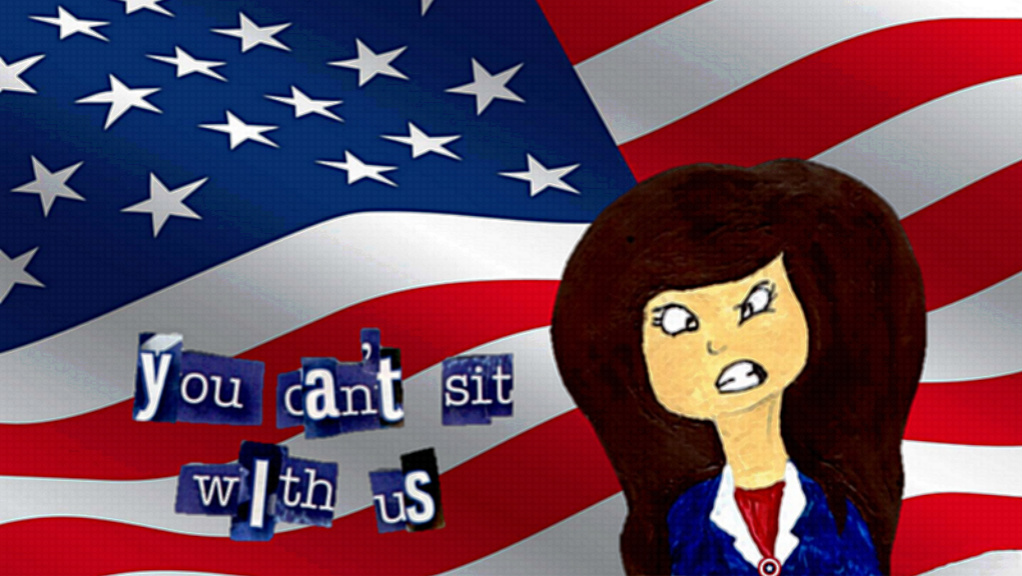The Perils of Nationalism
by Mandi Moon | published Oct. 14th, 2016
A student from the College of Imaging Arts and Science approaches Max Lowenthal Hall, home to the Saunders College of Business. She is stopped by a group of business majors as she reaches for the door.
SCB student: “Can we help you?”
CIAS student: “Yeah, I am thinking about taking a class from this college to help me learn how to start my own design business. I’m coming to check it out.”
SCB: “Interesting.” He turns to his possé. “Should we let her in, guys?”
Second SCB student: “Those art kids are weird — I heard they use Macs, and they have a tendency to fall asleep right in the middle of their lounges. She can take a look around, but I don’t think she should stay. It might encourage more art kids to come hang around, and then we would start to get run out of our own building.”
This is obviously a ridiculous fictional situation, but it is a scaled down version of one of several fears that results from intense nationalism.
Don’t get me wrong, there is nothing inherently wrong with loving your country. There is also nothing wrong with being proud and celebrating where you come from. The problems arise when your love reaches a point at which it starts to look less like love and more like an obsessive idea of superiority.
Think about it this way: I drive a Toyota Rav4. I love that thing. It’s big enough to hold everything I own and it doesn’t judge me when I drive around and sing along to 2000-era pop punk at the top of my lungs. However, I do not look at people who own, say, Honda Civics and refuse to let them come to my house. And I most definitely do not use my much heavier, structurally superior SUV to run them off the road.
In this scenario, my culture is my SUV, the Honda Civic owners are people from another country, my house is the U.S. and the urge to run the Civic drivers down is my over-inflated sense of cultural superiority.
All humor aside, a misguided sense of nationalism leads to real problems, not least among them being an insensitivity (and sometimes downright hostility) to the plights being faced by marginalized people like the Syrian refugees. Nationalism can result in an us-versus-them, zero-sum-game mindset, which causes us to believe that the only way we as a country can be successful is by refusing to share, like the kid in kindergarten who has hoarded all the cookies and will only give you one if you punch someone in the face for her or if you promise that his hair
If we all think our country is so great, then why wouldn’t we want to share it with as many people as possible? I understand where people are coming from when they worry about being overthrown, but so much of what is wrong with the world stems from looking at others as inherently different from (and inferior to) ourselves. Not to get too cheesy on you, but one small twist of fate, and you could have been on the other side. I know that empathy doesn’t come naturally to everyone, and I don’t believe we are personally responsible for everyone in the world who is suffering, but I think that holding ourselves and our country above others to the point where we can’t even imagine having U.S. road signs in both English and Spanish is toxic and walls us off from our roots as a conglomeration of those looking for a better life.
Of course, the idea that things getting better for one group results in the deterioration of something for the rest of us is an extremely oversimplified view of the world. Life is not a game. There is no a winner or loser. Not only that, but looking at life as a win-lose situation is not even likely to make you happy, and it’s also more likely to make the loser sullen and probably lead to much worse consequences. Remember Germany after World War I and the Treaty of Versailles? Yeah, we should probably try to avoid similar situations in the future.
Those of us who believe hyper-nationalism is a detriment are the same ones who remember that America is supposed to be a melting pot and is much better off staying that way, and we are definitely not in the minority. Sixty percent of Americans believe that having a more culturally diverse country increases our quality of life. I mean, come on — if we had been practicing isolationism since our founding, we wouldn’t have things like potatoes, tacos, pizza and countless traditions (e.g. Santa Claus) that we’ve borrowed from other countries. I don’t know about you, but my life would be much emptier without pizza.



